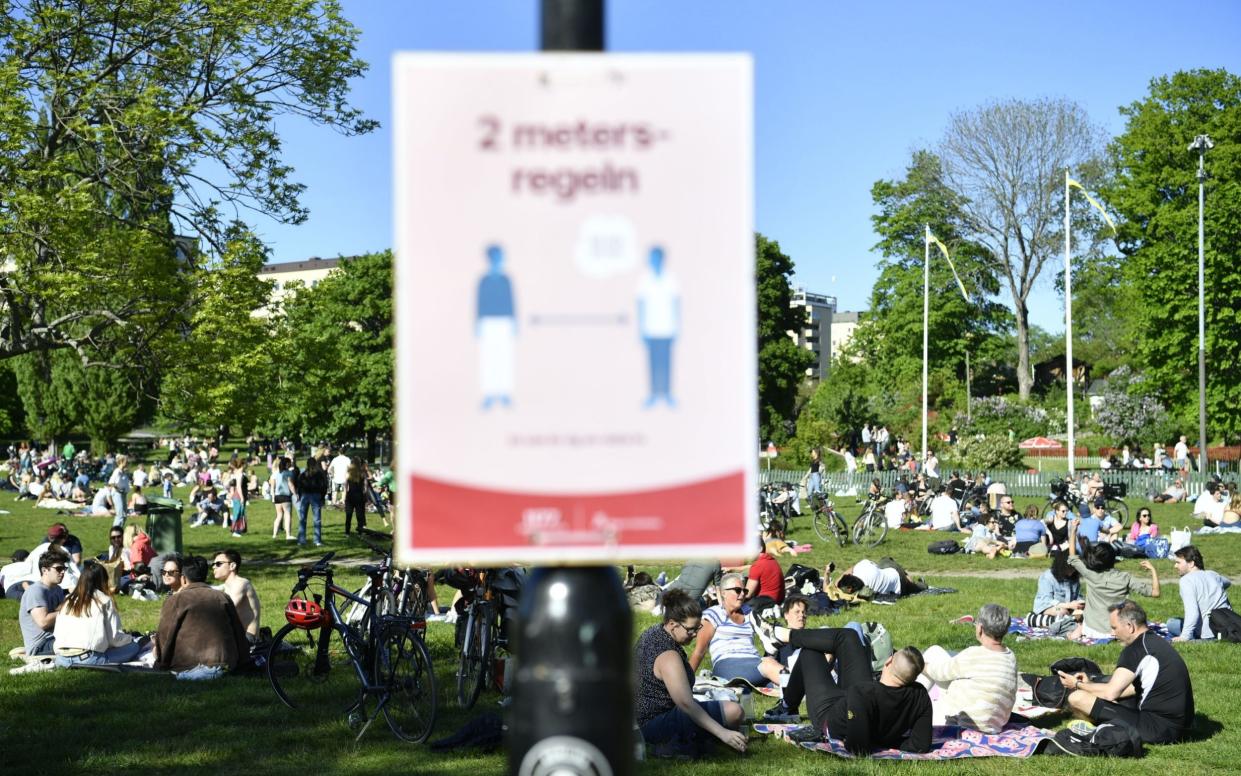Covid-19 immunity could be twice as high as believed, Swedish study finds


Up to a third of healthy people without symptoms of coronavirus may have developed immunity to it, international research suggests.
The findings suggest that public immunity could be as much as twice that found in antibody tests, meaning infection hotspots such as London could be further along the path to herd immunity than thought, and come after a study of an Italian town that was among the first in Europe to be hit by the virus showed that 40 per cent of those infected had no symptoms.
Until now, efforts to measure levels of protection against coronavirus have focused on antibodies, which have proved an unreliable measure.
At the start of the pandemic, Government advisers suggested at least 60 per cent of the population would need to be infected in order for herd immunity to be achieved. Instead, Britain entered lockdown on the basis of projections suggesting that allowing such levels of the disease would leave the NHS overwhelmed.
But a new study, by Sweden's Karolinska Institutet, suggests immunity levels in those without symptoms may be twice as high as thought.

It comes as statistics revealed that one in seven children in Leicester have now tested positive for coronavirus, with levels tripling in the last month. On Tuesday, Matt Hancock, the Health Secretary, said an "unusually high" incidence of coronavirus in children in the city had prompted ministers to shut down its schools and order it into lockdown.
The Telegraph has established that prevalence is now at 15 per cent among under-18s in Leicester – roughly three times greater than in England overall. Mr Hancock stressed that children were highly unlikely to get ill from the virus but might transmit it.
The Karolinska Institutet research on more than 200 adults, including healthy blood donors, was carried out in Sweden – the only country in Europe to avoid a lockdown.
As well as measuring antibody levels, tests examined levels of T-cell response. T-cells are a type of white blood cell that helps the immune system fightviruses, and are increasingly thought to have a key role in battling coronavirus.
In total, 30 per cent of the healthy blood donors were found to have developed "T-cell immunity" – twice the number of cases in which antibodies were detected.
Sampling in the UK suggests that around seven per cent of people in England have developed antibodies, rising to 17 per cent in London. The new research suggests that levels of "T-cell" immunity may be significantly higher.
Antibody testing has been dogged by problems, as tests have proved unreliable and it is not clear how much immunity antibodies confer.
The new study does not show what level of immunity is given by a T-cell response, but scientists are increasingly excited about the role played by T-cells because they believe it may explain why some groups, in particular children, appear to be more immune to coronavirus.
The immunological analysis of samples from over 200 people from Stockholm, carried out by Karolinska Institutet and Karolinska University Hospital, found that roughly 30 percent of healthy blood donors had Covid-19-specific T-cells despite no symptoms of infection.

Researcher Marcus Buggert, an assistant professor at Karolinska Institutet, told The Telegraph: "We see approximately twice as many individuals that have T-cell responses or T-cell immunity in comparison to antibodies.
"What this means is that we are probably underestimating the number of people that have some type of immunity. If it means that these individuals are totally protected, or if they're going to get a milder or asymptomatic disease in the future, it's hard to say."
Senior co-author Professor Hans-Gustaf Ljunggren said: "Our results indicate that public immunity to Covid-19 is probably significantly higher than antibody tests have suggested. If this is the case, it is of course very good news from a public health perspective."
The results have yet to be peer-reviewed.
Prof Ljunggren said that although the Karolinska study had analysed only a relatively small number of samples, if its findings are replicated they would apply to any country. London, for instance, might have about 30 percent immunity and New York above 40 percent.
"I think many of these numbers could be translated to any other country," he added. "If you have in London 15 percent of serologies [testing positive], you probably have the same degree of immunity."
While a blood test for Covid-19 antibodies can yield a result in as little as half an hour, the T-cell tests carried out at Karolinska can take as long as six days to set up, making commercial testing for T cell immunity unlikely in the short term.
On Tuesday, a German study suggested that exposure to the common cold could provide some level of immunity to coronavirus. The study, which included 185 people without Covid, found four in five had a T-cell response to Sars-Cov-2, the virus that causes Covid-19.
At the end of May, tests found that just 7.3 percent of Stockholm's inhabitants had developed Covid-19 antibodies by the end of April.
This was far short of the 25 percent Sweden's state epidemiologist, Anders Tegnell, had estimated, but Prof Ljunggren said that, with more recent Stockholm studies showing that about 17 percent of people had tested positive for antibodies, the predictions did not look so far out.
He said researchers had been initially "very puzzled with the low antibody responses", but added: "Now when we see significant T-cell responses in terms of percentages of people being affected by them, it makes sense."


